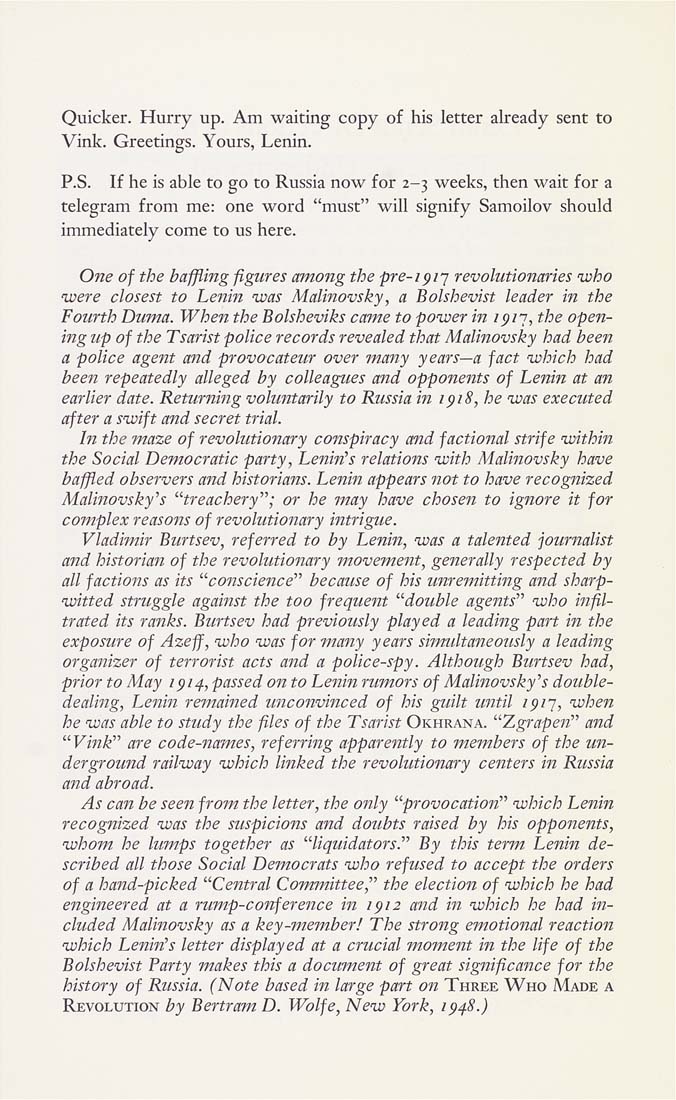Columbia Library columns (v.2(1952Nov-1953May))
(New York : Friends of the Columbia Libraries. )
|
||
|
|
|
|
| v.2,no.2(1953:Feb): Page 24 |

Quicker. Hurry up. Am waiting copy of his letter already sent to Vink. Greetings. Yours, Lenin. P.S. If he is able to go to Russia now for 2-3 weeks, then wait for a telegram from me: one word "must" will signify Samoilov should immediately come to us here. One of the baffling figures among the pre-i^i-j revolutionaries who were closest to Lenin was Malinovsky, a Bolshevist leader in the Fourth Duma. When the Bolsheviks came to power in i <//';, the open¬ ing up of the Tsarist police records revealed that Malinovsky had been a police agent and provocateur over many years—a fact which had been repeatedly alleged by colleagues and opponents of Lenin at an earlier date. Returning voluntarily to Russia in if)iS, he was executed after a swift and secret trial. In the maze of revolutionary conspiracy and factional strife within the Social Democratic party, Lenin's relations with Malinovsky have baffled observers and historians. Lenin appears not to have recognized Malinovsky's "treachery"; or he may have chosen to ignore it for complex reasons of revolutionary i7itrigue. Vladimir Burtsev, referred to by Lenin, was a talented journalist and historian of the revolutionary movement, generally respected by all factions as its "conscience" because of his unremitting and sharp- witted struggle against the too frequent "double agents" who infil¬ trated its ranks. Btirtsev had previously played a leading part in the exposure of Azeff, who was for vmny years simidtaneously a leading organizer of terrorist acts and a police-spy. Although Burtsev had, prior to May 1^14, passed on to Lenin rumors of Malinovsky's double- dealing, Lenin remained unconvinced of his guilt until if)i~l, when he was able to study the files of the Tsarist Okhrana. "Zgrapen" and "Vink" are code-names, referring apparently to members of the un¬ derground railway which linked the revolutionary centers in Russia and abroad. As can be seen from the letter, the only "p-ovocatio?i" which Lenin recognized was the suspicions and doubts raised by his opponents, whom he lumps together as "liquidators." By this term Lenin de¬ scribed all those Social Democrats who refused to accept the orders of a hand-picked "Central Committee" the election of which he had engineered at a rump-conference in 1(112 and in which he had in¬ cluded Malinovsky as a key-member! The strong emotional reaction which Lenin's letter displayed at a crucial moment in the life of the Bolshevist Party makes this a document of great significance for the history of Russia. (Note based in large part on Three Who AIade a Revolution by Bertram D. Wolfe, New York, 11)48.) |
| v.2,no.2(1953:Feb): Page 24 |







